Lesson 6 Stay away from the hospital课件(共26张PPT)
文档属性
| 名称 | Lesson 6 Stay away from the hospital课件(共26张PPT) |
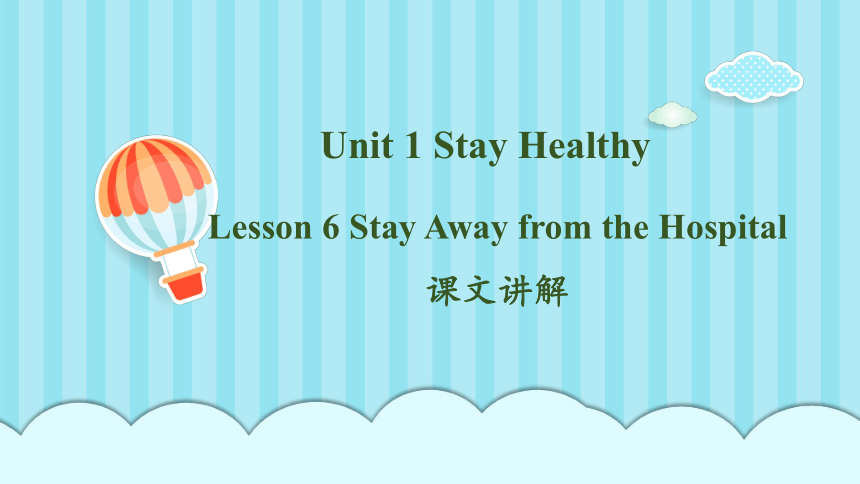
|
|
| 格式 | zip | ||
| 文件大小 | 3.6MB | ||
| 资源类型 | 教案 | ||
| 版本资源 | 冀教版 | ||
| 科目 | 英语 | ||
| 更新时间 | 2021-09-18 00:00:00 | ||
图片预览

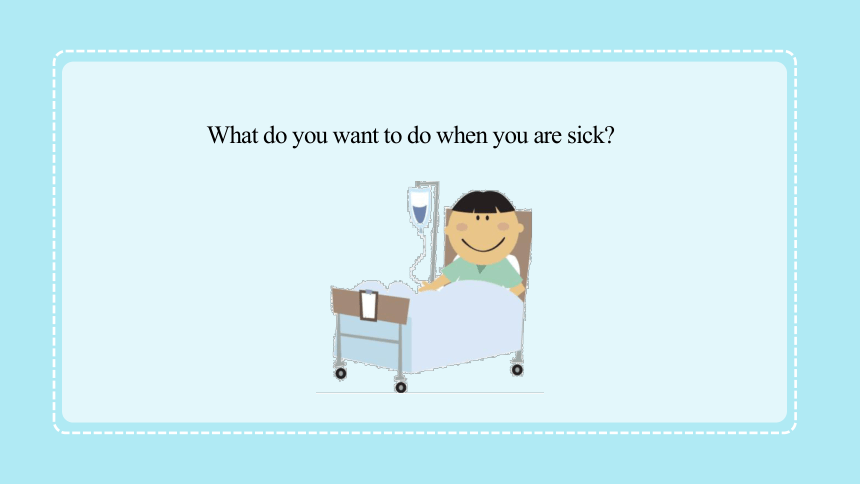
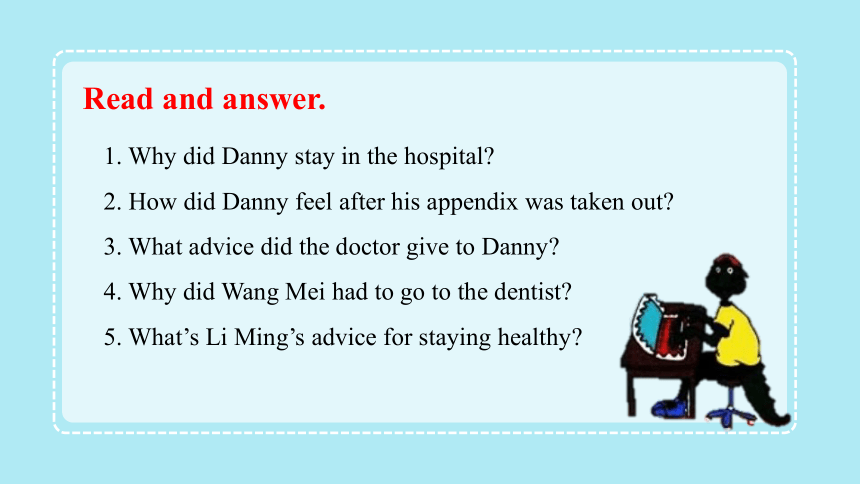
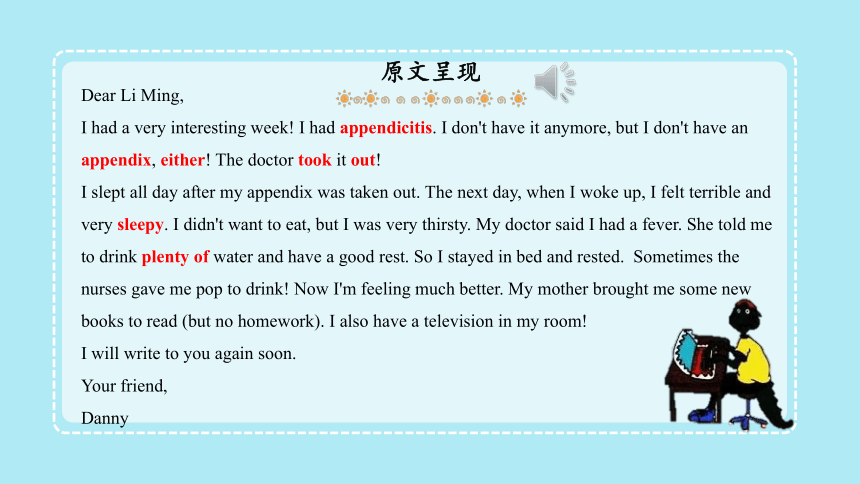


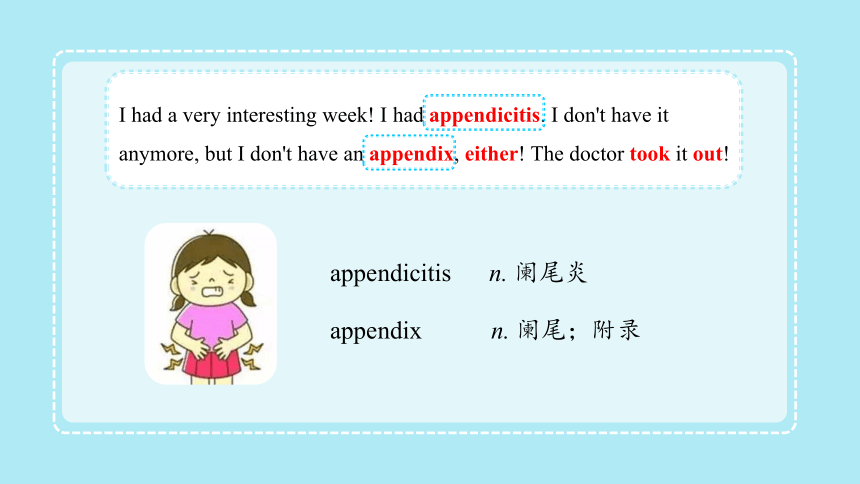
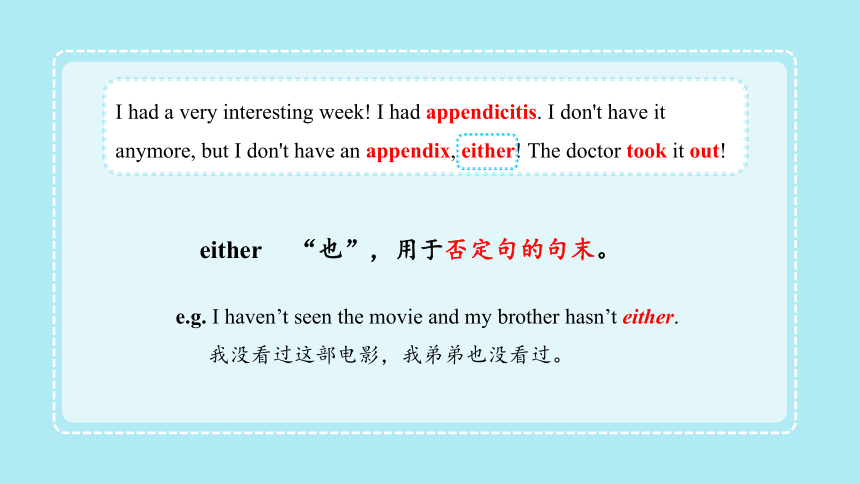

文档简介
(共26张PPT)
Lesson
6
Stay
Away
from
the
Hospital
课文讲解
Unit
1
Stay
Healthy
What
do
you
want
to
do
when
you
are
sick?
1.
Why
did
Danny
stay
in
the
hospital?
2.
How
did
Danny
feel
after
his
appendix
was
taken
out?
3.
What
advice
did
the
doctor
give
to
Danny?
4.
Why
did
Wang
Mei
had
to
go
to
the
dentist?
5.
What’s
Li
Ming’s
advice
for
staying
healthy?
Read
and
answer.
原文呈现
Dear
Li
Ming,
I
had
a
very
interesting
week!
I
had
appendicitis.
I
don't
have
it
anymore,
but
I
don't
have
an
appendix,
either!
The
doctor
took
it
out!
I
slept
all
day
after
my
appendix
was
taken
out.
The
next
day,
when
I
woke
up,
I
felt
terrible
and
very
sleepy.
I
didn't
want
to
eat,
but
I
was
very
thirsty.
My
doctor
said
I
had
a
fever.?She
told
me
to
drink
plenty
of
water
and
have
a
good
rest.
So
I
stayed
in
bed
and
rested.
?Sometimes
the
nurses
gave
me
pop
to
drink!
Now
I'm
feeling
much
better.
My
mother
brought
me
some
new
books
to
read
(but
no
homework).
I
also
have
a
television
in
my
room!
I
will
write
to
you
again
soon.
Your
friend,
Danny
原文呈现
Hi
Danny,
I'm
sorry
to
hear
that
you
were
sick
this
week.
Now
that
you
mention
it,
Wang
Mei
also
had
a
bad
day.
One
of
her
teeth
was
rotten,
so
she
had
to
go
to
the
dentist.
Fortunately,
you
and
Wang
Mei
are
both
getting
much
better
now.
I
think
we
should
try
hard
to
form
good
habits?so
that
we
can
stay
healthy
and
stay
away
from
the
hospital!
Yours,
Li
Ming
1.
Why
did
Danny
stay
in
the
hospital?
Read
and
answer.
He
had
appendicitis.
I
had
a
very
interesting
week!
I
had
appendicitis.
I
don't
have
it
anymore,
but
I
don't
have
an
appendix,
either!
The
doctor
took
it
out!
I
had
a
very
interesting
week!
I
had
appendicitis.
I
don't
have
it
anymore,
but
I
don't
have
an
appendix,
either!
The
doctor
took
it
out!
appendicitis
n.
阑尾炎
appendix
n.
阑尾;附录
I
had
a
very
interesting
week!
I
had
appendicitis.
I
don't
have
it
anymore,
but
I
don't
have
an
appendix,
either!
The
doctor
took
it
out!
either
“也”,用于否定句的句末。
e.g.
I
haven’t
seen
the
movie
and
my
brother
hasn’t
either.
我没看过这部电影,我弟弟也没看过。
拓展
表示“也”的词语辨析
用法
例句
too
用于肯定句的句末,前面常用逗号隔开
I’d
like
to
come,
too.
also
常用于肯定句的句中
She's
a
singer
and
also
an
actress.
as
well
常用于肯定句的句末
I
like
swimming
as
well.
either
常用于否定句的句末
The
car
is
beautiful
and
not
expensive
either.
take
out
切除;摘除;带走
e.g.
When
you
leave
the
park,
please
take
out
the
rubbish.
当你离开公园的时候,请带走你的垃圾。
I
had
a
very
interesting
week!
I
had
appendicitis.
I
don't
have
it
anymore,
but
I
don't
have
an
appendix,
either!
The
doctor
took
it
out!
2.
How
did
Danny
feel
after
his
appendix
was
taken
out?
Read
and
answer.
He
felt
terrible
and
very
sleepy.
He
didn’t
want
to
eat,
but
he
was
very
thirsty.
I
slept
all
day
after
my
appendix
was
taken
out.
The
next
day,
when
I
woke
up,
I
felt
terrible
and
very
sleepy.
I
didn't
want
to
eat,
but
I
was
very
thirsty.
I
slept
all
day
after
my
appendix
was
taken
out.
The
next
day,
when
I
woke
up,
I
felt
terrible
and
very
sleepy.
I
didn't
want
to
eat,
but
I
was
very
thirsty.
sleepy
/'sli:p?/
adj.
困倦的;瞌睡的
sleepy,
sleep,
asleep
与sleeping
辨析
adj.瞌睡的;困倦的
可作表语、定语和宾语补足语。
feel
sleepy感到困倦
sleepy
v.
&
n.
睡觉;睡眠
go
to
sleep
去睡觉
sleep
sleepy,
sleep,
asleep
与sleeping
辨析
adj.
睡着的
可作表语、宾语补足语,指状态。
fall
asleep入睡
asleep
形容词,在句中常作前置定语。
a
sleeping
bag
一个睡袋
sleeping
3.
What
advice
did
the
doctor
give
to
Danny?
Read
and
answer.
He
advised
Danny
to
drink
plenty
of
water
and
have
a
good
rest.
My
doctor
said
I
had
a
fever.?She
told
me
to
drink
plenty
of
water
and
have
a
good
rest.
My
doctor
said
I
had
a
fever.?She
told
me
to
drink
plenty
of
water
and
have
a
good
rest.
plenty
of
很多;充足
e.g.
They
spent
plenty
of
time
on
the
work.
在这项工作上他们花了很长时间。
可修饰可数和不可数名词
4.
Why
did
Wang
Mei
had
to
go
to
the
dentist?
Read
and
answer.
Because
one
of
her
teeth
was
rotten.
I'm
sorry
to
hear
that
you
were
sick
this
week.
Now
that
you
mention
it,
Wang
Mei
also
had
a
bad
day.
One
of
her
teeth
was
rotten,
so
she
had
to
go
to
the
dentist.
I'm
sorry
to
hear
that
you
were
sick
this
week.
Now
that
you
mention
it,
Wang
Mei
also
had
a
bad
day.
One
of
her
teeth
was
rotten,
so
she
had
to
go
to
the
dentist.
now
that
既然;由于
e.g.
Now
that
everyone
is
here
let’s
start.
既然现在人都齐了,咱们开始吧。
注意
I'm
sorry
to
hear
that
you
were
sick
this
week.
Now
that
you
mention
it,
Wang
Mei
also
had
a
bad
day.
One
of
her
teeth
was
rotten,
so
she
had
to
go
to
the
dentist.
mention
/'men?n/
v.
提到;写到(某人或某事)
He
can
speak
German
and
Japanese,
not
to
mention
English.
—Thank
you
very
much.
非常感谢你。
—Don’t
mention
it.
不客气。
5.
What’s
Li
Ming’s
advice
for
staying
healthy?
Read
and
answer.
We
should
try
hard
to
form
good
habits.
I
think
we
should
try
hard
to
form
good
habits?so
that
we
can
stay
healthy
and
stay
away
from
the
hospital!
I
think
we
should
try
hard
to
form
good
habits?so
that
we
can
stay
healthy
and
stay
away
from
the
hospital!
so
that
为了;以便
e.g.
I
speak
loudly
so
that
all
the
students
can
hear
me
clearly.
我大声说话,为的是所有学生都能听清楚。
引导目的状语从句
从句谓语动词常用情态动词may/might/can/could+
动词原形等
当主句主语与从句主语一致时
拓展
so
that
为了;以便
引导目的状语从句
so
that
so
as
to/in
order
to+
动词原形的简单句
转换
He
got
up
early
so
that
he
could
catch
the
early
bus.
=He
got
up
early
in
order
to/so
as
to
catch
the
early
bus.
为了赶上早班公交车,他早早就起床了。
He
worked
day
and
night
so
that
he
could
succeed.
He
worked
day
and
night
in
order
to/so
as
to
succeed.
他夜以继日地工作,为的是他能够成功。
Unit
1-Lesson
6
课后作业(微课配套)
Bye-bye
Lesson
6
Stay
Away
from
the
Hospital
课文讲解
Unit
1
Stay
Healthy
What
do
you
want
to
do
when
you
are
sick?
1.
Why
did
Danny
stay
in
the
hospital?
2.
How
did
Danny
feel
after
his
appendix
was
taken
out?
3.
What
advice
did
the
doctor
give
to
Danny?
4.
Why
did
Wang
Mei
had
to
go
to
the
dentist?
5.
What’s
Li
Ming’s
advice
for
staying
healthy?
Read
and
answer.
原文呈现
Dear
Li
Ming,
I
had
a
very
interesting
week!
I
had
appendicitis.
I
don't
have
it
anymore,
but
I
don't
have
an
appendix,
either!
The
doctor
took
it
out!
I
slept
all
day
after
my
appendix
was
taken
out.
The
next
day,
when
I
woke
up,
I
felt
terrible
and
very
sleepy.
I
didn't
want
to
eat,
but
I
was
very
thirsty.
My
doctor
said
I
had
a
fever.?She
told
me
to
drink
plenty
of
water
and
have
a
good
rest.
So
I
stayed
in
bed
and
rested.
?Sometimes
the
nurses
gave
me
pop
to
drink!
Now
I'm
feeling
much
better.
My
mother
brought
me
some
new
books
to
read
(but
no
homework).
I
also
have
a
television
in
my
room!
I
will
write
to
you
again
soon.
Your
friend,
Danny
原文呈现
Hi
Danny,
I'm
sorry
to
hear
that
you
were
sick
this
week.
Now
that
you
mention
it,
Wang
Mei
also
had
a
bad
day.
One
of
her
teeth
was
rotten,
so
she
had
to
go
to
the
dentist.
Fortunately,
you
and
Wang
Mei
are
both
getting
much
better
now.
I
think
we
should
try
hard
to
form
good
habits?so
that
we
can
stay
healthy
and
stay
away
from
the
hospital!
Yours,
Li
Ming
1.
Why
did
Danny
stay
in
the
hospital?
Read
and
answer.
He
had
appendicitis.
I
had
a
very
interesting
week!
I
had
appendicitis.
I
don't
have
it
anymore,
but
I
don't
have
an
appendix,
either!
The
doctor
took
it
out!
I
had
a
very
interesting
week!
I
had
appendicitis.
I
don't
have
it
anymore,
but
I
don't
have
an
appendix,
either!
The
doctor
took
it
out!
appendicitis
n.
阑尾炎
appendix
n.
阑尾;附录
I
had
a
very
interesting
week!
I
had
appendicitis.
I
don't
have
it
anymore,
but
I
don't
have
an
appendix,
either!
The
doctor
took
it
out!
either
“也”,用于否定句的句末。
e.g.
I
haven’t
seen
the
movie
and
my
brother
hasn’t
either.
我没看过这部电影,我弟弟也没看过。
拓展
表示“也”的词语辨析
用法
例句
too
用于肯定句的句末,前面常用逗号隔开
I’d
like
to
come,
too.
also
常用于肯定句的句中
She's
a
singer
and
also
an
actress.
as
well
常用于肯定句的句末
I
like
swimming
as
well.
either
常用于否定句的句末
The
car
is
beautiful
and
not
expensive
either.
take
out
切除;摘除;带走
e.g.
When
you
leave
the
park,
please
take
out
the
rubbish.
当你离开公园的时候,请带走你的垃圾。
I
had
a
very
interesting
week!
I
had
appendicitis.
I
don't
have
it
anymore,
but
I
don't
have
an
appendix,
either!
The
doctor
took
it
out!
2.
How
did
Danny
feel
after
his
appendix
was
taken
out?
Read
and
answer.
He
felt
terrible
and
very
sleepy.
He
didn’t
want
to
eat,
but
he
was
very
thirsty.
I
slept
all
day
after
my
appendix
was
taken
out.
The
next
day,
when
I
woke
up,
I
felt
terrible
and
very
sleepy.
I
didn't
want
to
eat,
but
I
was
very
thirsty.
I
slept
all
day
after
my
appendix
was
taken
out.
The
next
day,
when
I
woke
up,
I
felt
terrible
and
very
sleepy.
I
didn't
want
to
eat,
but
I
was
very
thirsty.
sleepy
/'sli:p?/
adj.
困倦的;瞌睡的
sleepy,
sleep,
asleep
与sleeping
辨析
adj.瞌睡的;困倦的
可作表语、定语和宾语补足语。
feel
sleepy感到困倦
sleepy
v.
&
n.
睡觉;睡眠
go
to
sleep
去睡觉
sleep
sleepy,
sleep,
asleep
与sleeping
辨析
adj.
睡着的
可作表语、宾语补足语,指状态。
fall
asleep入睡
asleep
形容词,在句中常作前置定语。
a
sleeping
bag
一个睡袋
sleeping
3.
What
advice
did
the
doctor
give
to
Danny?
Read
and
answer.
He
advised
Danny
to
drink
plenty
of
water
and
have
a
good
rest.
My
doctor
said
I
had
a
fever.?She
told
me
to
drink
plenty
of
water
and
have
a
good
rest.
My
doctor
said
I
had
a
fever.?She
told
me
to
drink
plenty
of
water
and
have
a
good
rest.
plenty
of
很多;充足
e.g.
They
spent
plenty
of
time
on
the
work.
在这项工作上他们花了很长时间。
可修饰可数和不可数名词
4.
Why
did
Wang
Mei
had
to
go
to
the
dentist?
Read
and
answer.
Because
one
of
her
teeth
was
rotten.
I'm
sorry
to
hear
that
you
were
sick
this
week.
Now
that
you
mention
it,
Wang
Mei
also
had
a
bad
day.
One
of
her
teeth
was
rotten,
so
she
had
to
go
to
the
dentist.
I'm
sorry
to
hear
that
you
were
sick
this
week.
Now
that
you
mention
it,
Wang
Mei
also
had
a
bad
day.
One
of
her
teeth
was
rotten,
so
she
had
to
go
to
the
dentist.
now
that
既然;由于
e.g.
Now
that
everyone
is
here
let’s
start.
既然现在人都齐了,咱们开始吧。
注意
I'm
sorry
to
hear
that
you
were
sick
this
week.
Now
that
you
mention
it,
Wang
Mei
also
had
a
bad
day.
One
of
her
teeth
was
rotten,
so
she
had
to
go
to
the
dentist.
mention
/'men?n/
v.
提到;写到(某人或某事)
He
can
speak
German
and
Japanese,
not
to
mention
English.
—Thank
you
very
much.
非常感谢你。
—Don’t
mention
it.
不客气。
5.
What’s
Li
Ming’s
advice
for
staying
healthy?
Read
and
answer.
We
should
try
hard
to
form
good
habits.
I
think
we
should
try
hard
to
form
good
habits?so
that
we
can
stay
healthy
and
stay
away
from
the
hospital!
I
think
we
should
try
hard
to
form
good
habits?so
that
we
can
stay
healthy
and
stay
away
from
the
hospital!
so
that
为了;以便
e.g.
I
speak
loudly
so
that
all
the
students
can
hear
me
clearly.
我大声说话,为的是所有学生都能听清楚。
引导目的状语从句
从句谓语动词常用情态动词may/might/can/could+
动词原形等
当主句主语与从句主语一致时
拓展
so
that
为了;以便
引导目的状语从句
so
that
so
as
to/in
order
to+
动词原形的简单句
转换
He
got
up
early
so
that
he
could
catch
the
early
bus.
=He
got
up
early
in
order
to/so
as
to
catch
the
early
bus.
为了赶上早班公交车,他早早就起床了。
He
worked
day
and
night
so
that
he
could
succeed.
He
worked
day
and
night
in
order
to/so
as
to
succeed.
他夜以继日地工作,为的是他能够成功。
Unit
1-Lesson
6
课后作业(微课配套)
Bye-bye
同课章节目录
- Unit 1 Stay Healthy
- Lesson 1 What's Wrong,Danny?
- Lesson 2 A Visit to the Dentist
- Lesson 3 Good Food, Good Health
- Lesson 4 Don't Smoke, Please!
- Lesson 5 Jane's Lucky Life
- Lesson 6 Stay Away from the Hospital
- Unit Review
- Unit 2 Great People
- Lesson 7 What Is the Meaning of Lift?
- Lesson 8 A Universe of Thought
- Lesson 9 China's Most Famous "Farmer"
- Lesson 10 Touch the World
- Lesson 11 To China, with Love
- Lesson 12 Guess My Hero!
- Unit Review
- Unit 3 Safety
- Lesson 13 Be Careful,Danny!
- Lesson 14 Accidents Happen
- Lesson 15 My Helmet Saved My Life!
- Lesson 16 How Safe Is Your Home?
- Lesson 17 Staying Safe in an Earthquake
- Lesson 18 Never Catch a Dinosaur
- Unit Review
- Unit 4 Stories and poems
- Lesson 19 A Story or a Poem?
- Lesson 20 Say It in Five
- Lesson 21 The Fable of the Woodcutte
- Lesson 22 The Giant(Ⅰ)
- Lesson 23 The Giant(Ⅱ)
- Lesson 24 Writing a Poem
- Unit Review
- Unit 5 Look into Science
- Lesson 25 Let's Do an Experiment!
- Lesson 26 Keep the Candle Burning
- Lesson 27 Planet Danny
- Lesson 28 The Study of Living Things
- Lesson 29 DNA—The Story of You
- Lesson 30 Science Affects Us
- Unit Review
- Unit 6 Movies and Theate
- Lesson 31 A movie or a Play
- Lesson 32 Moving Pictures
- Lesson 33 The Fisherman and the Goldfish(Ⅰ)
- Lesson 34 The Fisherman and the Goldfish(Ⅱ)
- Lesson 35 Theatres Are Fun!
- Lesson 36 Making Plays Is Fun
- Unit Review
